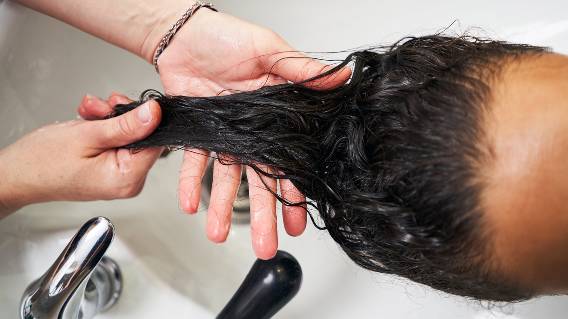Chemical Hair Straightener Lawsuit Claims They Caused Uterine Cancer
Editors carefully fact-check all Consumer Notice, LLC content for accuracy and quality.
Consumer Notice, LLC has a stringent fact-checking process. It starts with our strict sourcing guidelines.
We only gather information from credible sources. This includes peer-reviewed medical journals, reputable media outlets, government reports, court records and interviews with qualified experts.

Women have begun taking legal action against cosmetic giants such as L’Oreal and Revlon, alleging that chemical hair straightening products caused their uterine cancer.
Hair straightener lawsuits were sparked by a recent study at the National Institutes of Health showing that women who use the products regularly are more than twice as likely to develop the cancer than those who do not.
In October, only days after the study was released, Jenny Mitchell of Missouri filed a federal lawsuit in the Northern District of Illinois naming five companies as defendants.
Mitchell was diagnosed with uterine cancer in 2018 at age 28. She underwent a hysterectomy a month later, leaving her unable to have children.
“I was devastated,” Mitchell told The Washington Post. “I felt deceived. I felt hurt. My dreams of becoming a mother were gone.”
Mitchell, who started using hair straightening products in grade school, is suing L’Oreal, SoftSheen Carson, Strength of Nature, Dabur and Namaste Laboratories, the makers of the chemical hair straighteners.
Her lawsuit alleges that companies knew or should have known that their products increased the risk of uterine cancer. They misrepresented the products as safe, she said, and provided no warnings that they came with risks.
Mitchell said her family has no history of uterine cancer. She is seeking $75,000 in monetary compensation and payment for all medical expenses.
Rate of Uterine Cancers Doubled, Study Says
According to the data, only 1.64% of women who never used hair straighteners eventually developed uterine cancer before the age of 70, compared to 4.05% of those who used hair straightening products frequently.
“The doubling rate is concerning,” said lead author Dr. Alexandra White, Ph.D., head of the National Institute of Environmental Health Sciences. “However, it is important to put this information in context – uterine cancer is a relatively rare type of cancer.”
Brands of the products or chemical ingredients were not collected, or named, in the study. Researchers, though, noted several chemicals that are used in straightening products, including formaldehyde, bisphenol A, metals and parabens.
They also noted that hair straighteners could be more harmful than other personal care products because of increased absorption through the scalp due to possible lesions or burns.
Straightener products have been sold under the brand names Dark & Lovely, Optimum Care, Motions, Just for Me, Namaste, Soft and Beautiful and others.
Chemical straighteners, according to White, contain a number of different chemicals that may act as endocrine disruptors that could be an important health risk.
This was the first epidemiologic study that has examined the relationship between straightener use and uterine cancer. The use of other hair products, including body waves, permanents and dyes, was not associated with a higher incidence of uterine cancer.
Researchers also observed stronger associations with straightener use among women with low physical activity and those who were overweight.
“Women with higher physical activity might be less susceptible to other risk factors for uterine cancer,” study authors wrote. “However, more studies are warranted to understand the interrelationship between physical activity, hair product use and uterine cancer.”
The findings further confirmed previous studies showing that hair straightening products could increase the risk of other hormone-related cancers.
Black Women May Face Higher Risks
The results of the NIH study have drawn considerable attention in the Black community, where the use of hair straighteners is common.
Although Black women comprised just 7.4% of those in the study, they accounted for 60% of those who reported using a hair-straightening product the previous year. The study did not find that the relationship between chemical hair straighteners and uterine cancer was different by race, only the commonality of use.
“Because Black women use hair straightening or relaxer products more frequently and tend to initiate use at earlier ages than other races or ethnicities, these findings may be even more relevant for them,” said co-author Che-Jung Chang, Ph.D., research fellow at the National Institute of Environmental Health Sciences, which is part of the NIH.
Uterine cancer findings were part of a larger, much broader Sister Study at the NIH that involved 33,497 women. The women were followed for 11 years, and 378 cases of uterine cancer were diagnosed.
The Journal of the National Cancer Institute published the study detailing the data. Authors estimated that 66,000 women in the U.S. will be diagnosed with uterine cancer in 2022, leading to about 12,000 deaths.
Uterine cancer is the sixth-most common cancer for women. The vast majority of uterine cancers are known as endometrial cancers, which start in the lining of the uterus.
“We observed that straightening-product use was positively associated with uterine cancer,” study authors concluded. “Our findings, which identify hair straightening use as a potential target for intervention, are particularly relevant for public health approaches to reduce uterine cancer incidence.”
Mitchell believes there will be many others with uterine cancer following her lead and taking legal action.
“I am the first voice of many voices to come that will stand up to these companies and say, ‘No more,’” she said.